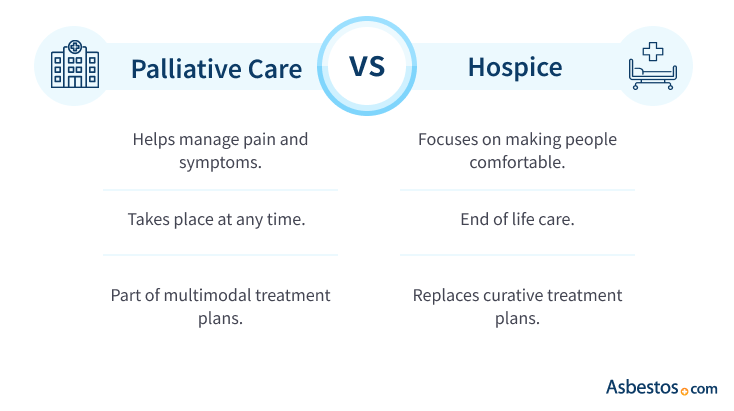Based on Your Reading:
Get a Mesothelioma Treatment Guide

Find a Top Mesothelioma Doctor

Access Help Paying for Treatment

Palliative care includes several mesothelioma treatment options, including surgery, radiation therapy, chemotherapy and immunotherapy. The focus is on managing pain and other cancer symptoms to improve quality of life. Early palliative treatments offer the best chance of relieving symptoms.
Written by Dr. Kristopher Bunting • Edited By Walter Pacheco • Medically Reviewed By Dr. Andrea Wolf
The Mesothelioma Center at Asbestos.com has provided patients and their loved ones the most updated and reliable information on mesothelioma and asbestos exposure since 2006.
Our team of Patient Advocates includes a medical doctor, a registered nurse, health services administrators, veterans, VA-accredited Claims Agents, an oncology patient navigator and hospice care expert. Their combined expertise means we help any mesothelioma patient or loved one through every step of their cancer journey.
More than 30 contributors, including mesothelioma doctors, survivors, health care professionals and other experts, have peer-reviewed our website and written unique research-driven articles to ensure you get the highest-quality medical and health information.
My family has only the highest compliment for the assistance and support that we received from The Mesothelioma Center. This is a staff of compassionate and knowledgeable individuals who respect what your family is experiencing and who go the extra mile to make an unfortunate diagnosis less stressful. Information and assistance were provided by The Mesothelioma Center at no cost to our family.LashawnMesothelioma patient’s daughter


Bunting, K. (2024, March 7). Managing Mesothelioma Pain with Palliative Treatment. Asbestos.com. Retrieved April 16, 2024, from https://www.asbestos.com/treatment/palliative/
Bunting, Kristopher. "Managing Mesothelioma Pain with Palliative Treatment." Asbestos.com, 7 Mar 2024, https://www.asbestos.com/treatment/palliative/.
Bunting, Kristopher. "Managing Mesothelioma Pain with Palliative Treatment." Asbestos.com. Last modified March 7, 2024. https://www.asbestos.com/treatment/palliative/.
Palliative treatment benefits mesothelioma survivors with its holistic approach to pain management, nutrition and overall health. A May 2023 study published in the British Journal of Community Nursing, for example, spotlighted the benefits of palliative care for mesothelioma patients, particularly “early-stage engagement” of these services.
Another study published in the November-December 2022 issue of In Vivo concluded that there are definitive benefits in terms of quality of life and palliative treatment could extend life. Researchers found, “Early palliative care intervention from diagnosis to 140 days may improve overall survival in patients.”
Palliative treatment aimed at minimizing symptoms can have broader benefits for overall well being. As a recent Australian study of pleural mesothelioma patients noted, “anorexia is a major symptom in mesothelioma” and “weight loss is strongly associated with poor survival.” Palliative efforts to address poor appetite in the study had significant benefits on patient survival rate.
Coordinating care between multiple healthcare providers is essential to providing the best possible mesothelioma care, whether it’s palliative or curative care. According to a 2021 study, the most common concern among mesothelioma patients and their families was having a single person manage coordinated palliative care.
Both palliative and hospice care aim to reduce pain, improve quality of life and keep patients comfortable, but they aren’t the same. Hospice is specifically for people with a life expectancy of six months or less and doesn’t include curative treatment. Palliative care, however, can go hand-in-hand with cancer treatment.
Surgery, radiation, chemotherapy and other medications can all be part of palliative treatment. Improving breathing, reducing excess fluid in the chest and abdomen because of mesothelioma tumors, for example, can be beneficial outcomes of palliative treatment.

Patient Advocate Karen Selby at The Mesothelioma Center shared that when speaking with survivors and their families, “There’s still a lot of confusion about what palliative treatment is versus hospice care.” She added, “I find it important to explain what palliative care is and how patients typically do better integrating it early on rather than waiting.”
Colleague Dr. Snehal Smart agreed, noting: “When patients talk to me about quality of life concerns, I bring up palliative care. I share that it’s an important option for treating the symptoms they’re experiencing.”
Get a Mesothelioma Treatment Guide

Find a Top Mesothelioma Doctor

Access Help Paying for Treatment

Palliative care requires a team approach to ensure that all of a patient’s needs are addressed. Meeting the physical needs of mesothelioma can involve oncologists, surgeons, mesothelioma clinical nurse specialists, pain specialists, physical therapists and dietitians. Addressing stress, depression, anxiety, fear and exhaustion is also essential to improving quality of life for survivors and their loved ones.
To address all aspects of a patient’s life, mental health experts, patient advocates and those who can provide spiritual support are also key components of palliative care teams. Mesothelioma survivor Michael Cole shared his experience with mental health support to help alleviate symptoms. He explained, “It had become almost impossible for me to sleep and I began using mild medication to help.”
My thoracic surgeon recommended I speak with a psychiatrist who explained how trauma to the body interacts with brain function, which can result in a loop effect causing more pain and stress.Pleural Mesothelioma Survivor
Palliative care can take place in a hospital, cancer center, long-term care facility or at home. Cancer centers, especially NCI-designated comprehensive care centers, specialize in meeting the unique needs of cancer patients and their families. You have a variety of options when choosing where to receive palliative care.
The most effective palliative treatment for you can depend on the type of mesothelioma you have and your individual symptoms. The stage at which you were diagnosed also plays a role.
Roughly 60% of peritoneal mesothelioma patients, for example, aren’t candidates for surgery. Pericardial mesothelioma, which only comprises about 1% of all cases, is resistant to radiation therapy. Radiation is difficult to safely administer to the heart lining without harming the heart.
Treatment options can also cause side effects. While side effects such as pain, fatigue or nausea are typically temporary and manageable, you should discuss risks and if benefits outweigh potential discomfort with your doctor.
Palliative treatment to relieve mesothelioma symptoms may also involve one or more types of medical care. Multimodal therapy is common in both curative and palliative mesothelioma care.
Palliative surgery can involve relieving the symptoms that fluid build-up around the lungs (pleural effusion), heart (pericardial effusion) or abdomen (ascites) can cause. Accumulation of fluid can cause difficulty breathing, pain and other complications.
Cytoreductive surgery is invasive surgery to remove as much of the tumor as possible. Cytoreductive surgery, or debulking surgery, can be part of the treatment for pleural and peritoneal mesothelioma as well as part of palliative care.
Intraperitoneal chemotherapy often follows debulking surgery for peritoneal mesothelioma. Systemic chemotherapy may follow cytoreductive surgery for pleural mesothelioma.
Chemotherapy is a treatment for mesothelioma, but it can also play a role in palliative care. The side effects of chemotherapy can be harsh, however, including nausea, vomiting, fatigue, hair loss and loss of appetite. While medication can reduce negative effects of chemotherapy, they must be considered when choosing a palliative care approach.
Chemotherapy is often used following cytoreductive surgery. HIPEC provides palliative care, can extend life expectancy and can be curative in certain cases. HITHOC hasn’t been found to provide as much benefit but can be beneficial for some patients.
Authors of a recent study published in Oncology Letters note, “In the first line of palliative systemic treatment” immunotherapy can be “used alone or combined with other drugs.” The researchers explain that immunotherapy can not only improve overall survival for cancer patients, but that “The significant improvement in the quality of life of patients treated with immunotherapy is also noteworthy.”
The study does caution that some palliative treatments can affect immunotherapy. Opioids prescribed for pain and corticosteroids for inflammation have immunosuppressive effects. Antibiotics’ impact on healthy gut bacteria may impact immunotherapy and the authors call for more study of this possibility.
The Food and Drug Administration approved the combination of immunotherapy drugs Opdivo and Yervoy as a first-line treatment for pleural mesothelioma in 2020. These and other types of immunotherapy are targeted anti-cancer treatments that modify cells from a patient’s own immune system.
Radiation can shrink tumors, helping to relieve the pain, pressure and other uncomfortable symptoms they can cause. While it can have side effects such as skin irritation, fatigue and tissue damage, it’s useful for improving overall quality of life.
Radiation is used almost exclusively in pleural mesothelioma. It’s not effective in pericardial mesothelioma and is difficult to use effectively in peritoneal mesothelioma.
Tumors cause nerve pain; chemotherapy causes neuropathy; and pleural effusions and ascites cause pain. Surgery and medication can help relieve certain types of pain. Mild pain may be treated with over-the-counter pain relievers such as acetaminophen. More severe pain is usually treated with opioid drugs, such as morphine, oxycodone, or tramadol. IV pain medication may be needed for severe pain.
Other pain management techniques can be helpful as well. While pain originates in the body, it’s interpreted in the brain. Cognitive and behavioral techniques may help you manage your pain.
Under the care of a psychiatrist, physical therapist, acupuncturist or other trained professional, you may improve your physical symptoms, emotional and psychological well-being and even increase mesothelioma life expectancy. Complementary and alternative medicine isn’t recommended to replace traditional treatment, but it can offer additional avenues to finding symptomatic relief and improving your quality of life.
Many patients find relief with a holistic approach to palliative care. Some patients, for example, may concurrently use prescription medications to treat anxiety and depression, engage in cognitive behavioral therapy and practice yoga and meditation.

One of the most impactful decisions a cancer patient can make is electing to improve their diet with the supervision of a licensed dietitian. Nutrition is a key component of mesothelioma care, helping the body heal and sustain the immune system.
A mesothelioma diet customized for you may be followed in conjunction with taking prescription drugs to increase appetite and treat nausea and vomiting from chemotherapy or immunotherapy. All cancer patients should consult a licensed dietitian and their mesothelioma treatment team before making changes to their diet.
Your web browser is no longer supported by Microsoft. Update your browser for more security, speed and compatibility.
If you are looking for mesothelioma support, please contact our Patient Advocates at (855) 404-4592
